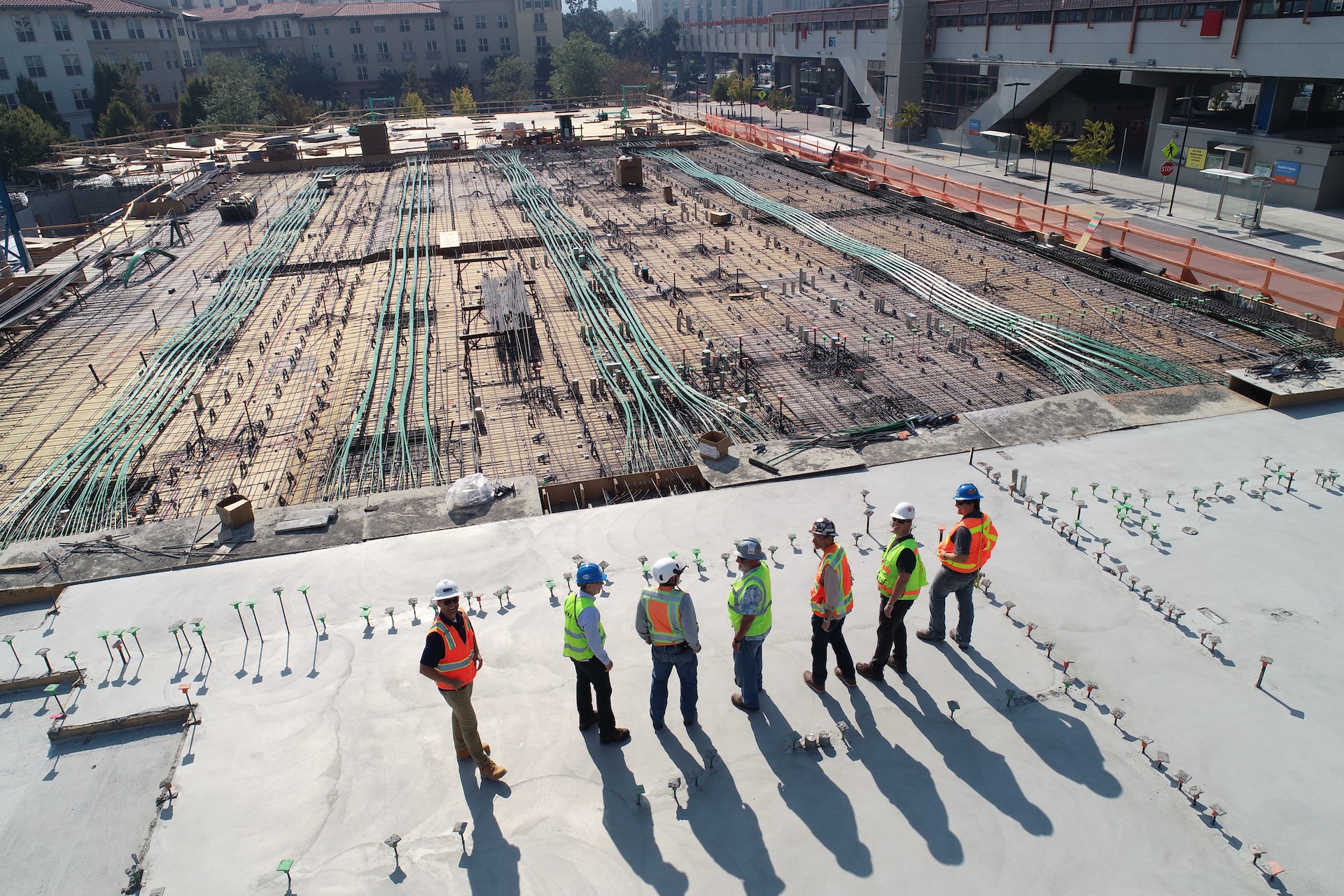Not quite ready to sell?
Subscribe to receive the latest resources for small business owners.
Considering a sale of your construction business but unsure of how much it’s worth? Or perhaps, you’re trying to understand how much you can get for your construction business so that you can plan for retirement?
As a business brokerage that specializes in “main street” businesses, we work with dozens of construction business owners each quarter. Whether it’s helping them think about exit planning or bringing their business to market for a sale, we often hear the same questions about valuing a construction business.
In this post, we’ll break down the basic process for valuing a construction business. That being said, if you want to get a detailed valuation of your own business, please reach out. We offer complimentary valuations to owners of small businesses in the U.S.
What is a Business Valuation?
As we dive into in our Seller’s Guide to Small Business Valuation, the goal of a business valuation is to analyze a business’s historic cash flow, operations, and transferability in order to determine how much it’s worth.
A valuation should help owners understand the most likely price that an entrepreneur will pay to take over ownership of the business. This price should not represent the highest price that someone on planet Earth will pay nor the price that will sell the business immediately.
As we like to say, you could sell a house for $100K over the market value, but it may take years of sitting on the market. At the same time, you could give a house away for pennies on the dollar and never spend time on the market.
A fair market value is designed to represent the normal buyer of a business in a normal market. Sure, each business is somewhat distinct, but generally there are rules of thumb for pricing a business, just as there are rules of thumb that a lender will evaluate when working with a buyer to finance a transaction.
How Do I Value My Construction Business?
To calculate the value of a construction company, start by analyzing the past three years of your tax returns. Once you’ve pulled these financial documents from your records or your CPA, the next step is to calculate Seller’s Discretionary Earnings for each year. Seller’s discretionary earnings (SDE) is a proxy for how much future earnings an owner-operator would receive from owning the business.
To get to SDE, we add up the following:
Net Income (reported to the IRS on the tax return)
Interest
Depreciation
Amortization
Owner Compensation (e.g., salary of the owner, healthcare and retirement benefits)
Discretionary Expenses (e.g., kids on the payroll who aren’t actively working in the business)
We then need to adjust the initial SDE number for common “edge” cases in a small business:
If you own a shop for storing equipment or trucks, are you under- or overpaying rent? Adjust the rent expenses to account for what you would charge the buyer of your business on an ongoing basis.
Did you make a big purchase of a personal vehicle? Make sure to add back the cost of the vehicle (and subtract any depreciation), as the buyer would not be forced to make such a purpose.
Do you employ family members working as bookkeepers or on crews? Adjust the payroll to remove family members who do not work and pay market prices to family members who would need to be replaced.
Did you book PPP or EIDL as income? Make sure you remove any COVID-related loans from the income statement.
Now that we have a number for Seller’s Discretionary Earnings and we’ve adjusted it for a new buyer, we need to come up with an average that represents future earnings. For instance, if your market had a net-exodus of people during COVID, new home builds may have gone down and finally started to recover in 2021 and 2022. Or, perhaps you were in a market that took off while rates were low but now that debt is more expensive, fewer construction projects are happening.
There are a number of ways to calculate a fair average of SDE across the years. At Beacon, we use a somewhat complicated formula. If you’re doing a valuation at home, we recommend that you weight the most recent year 50%, the second most recent year 37.5% and the third most recent year 12.5%.
For instance, if you had SDE of $400K, $425K, and $350K in 2022, 2021, and 2020, you would do the following: $400K x 50% ($200K) + $425K x 37.5% ($159.4K) + $350K x 12.5% ($43.7K). Adding those up would yield $403.1K. This would be your weighted average SDE.
Once you’ve calculated your weighted average SDE, you’ll need to apply a multiple to your earnings to determine the value of your business when ignoring cash on the balance sheet.
What Affects The Valuation of My Construction Company?
Unlike some industries, the value of construction businesses can vary widely. This is due to how different construction companies can be. Some may just be an owner and a rotating cast of subcontractors. Others may have a fully built out office staff with a number of long tenured subcontractors and in-house architects, engineers and more.
With that in mind, a construction business's multiple can range from 1.5x to over 4x seller’s discretionary earnings. The exact multiple used is based on a number of factors. For instance, more niche construction businesses command a higher multiple, as do construction businesses that are larger. As you can tell by the numbers below, the exact multiple for a business can vary widely and depends on a variety of data points. At Beacon, we take into account over 150 data points.
For those performing a quick valuation at home, we recommend the following approach:
For construction companies with less than $500K in gross revenue
Use a multiple of 1.5 - 1.75x
For construction companies with $500K to $1M in gross revenue
Use a multiple of 1.75 - 2.5x
For construction companies with $1M to $5M in gross revenue
Use a multiple of 2.5 - 3.5x
For construction companies with more than $5M in gross revenue
Use a multiple of 3.5 - 4x
Curious about how to increase the value of your construction company?
Inventory levels: Businesses that operate with little to no inventory, or offload inventory to GCs, are valued at higher multiples. This is because there is less working capital tied up in the business in order to earn the same amount of revenue. Working capital typically shows up in the balance sheet of a company as current liabilities and current assets.
Repeat customers: While few construction companies have true recurring revenue, many may have repeat customers or unique sales channels. Those that have many repeat customers or strong channels for acquiring jobs will be valued at higher multiples. This is because there is more “goodwill” in the business. It’s not “eat what you kill” each month to find jobs from scratch.
Owner involvement: If you’re a passive owner, you can often slide up to the top-end of the range for your revenue size. The number of potential buyers who can afford a construction business but do not have time to actively operate it is greater than the number of potential buyers who can afford a construction company and have time to actively operate it. As the saying goes, the more potential buyers, the higher the price.
Minimal family involvement: We see a number of construction companies where the sons are involved in working jobs, either as subcontractors or as actual W-2 employees. When this is the case, typically there is a lower multiple on the SDE, as the first thing a buyer has to do is hire employees or find subcontractors to replace the family members who often leave in the event of a sale.
Licensing requirements: In certain states and for certain types of construction projects, the company or the owner of the company may have to hold a license at the state level. The exact requirements of a new owner can impact the price for a construction business, regardless of the valuation methods. Simply put, the bigger the barrier to a buyer coming into the industry, the fewer buyers who will bid up the price of your business.
How Do I Maximize The Value of My Construction Company?
There are a number of ways to increase the value of a business. For personalized advice, we recommend getting a complimentary valuation and speaking to someone on our team who specializes in the construction industry.
Aside from that, there are a few pointers for increasing the value of your business:
Clean up your books: At the end of the day, income reported to the government is valued higher than “discretionary expenses” that a buyer won’t have to pay. Why? It’s easy to prove income reported to the government. It’s hard to prove that a phone bill is really for your family member who doesn’t work in the business.
Retain quality labor: Even if it costs more to the business, finding legal and high quality labor is crucial to maximizing business value. Good, tenured workers and subcontractors help de-risk the impact of a well-respected owner leaving the business and give banks peace of mind when lending to a buyer. Moreover, these teammates can help train the buyers up on “how things are done.”
Get contracts in place: Regardless of whether you work in residential or commercial, having written contracts with your clients is important for ensuring that the buyer can pick up where you left off. These contracts are also great written proof of the reputation that you’ve built.
Consider specialization: Construction companies that focus on a niche demand a higher multiple than those that do general contracting for anyone. Why? They typically are able to drive higher margins and larger average contract values than more “generalist” operations.
Not quite ready to sell?
Subscribe to receive the latest resources for small business owners.

If you're interested in acquiring a Main Street business, Katie is your go-to person. Katie hails from Kansas City originally and majored in Art History at the University of Kansas. In her free time, she enjoys climbing, paddleboarding, and cooking.
Information posted on this page is not intended to be, and should not be construed as tax, legal, investment or accounting advice. You should consult your own tax, legal, investment and accounting advisors before engaging in any transaction.

Calder Capital

Sam Domino


